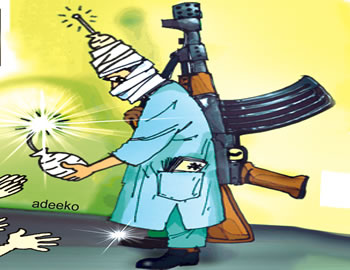What happened in Nice, France, last week, shocked the world because it was basically tangential and bereft of the expected modus operandi of modern day terrorism. From all indications, even the Western world in all its sophistication was not prepared for it. This, in fact, shows that the world has yet to totally grasp the true dynamic of terrorism and the exact psyche of people that perpetrate them.
Again, it depicts the potential ingenuity of mankind towards deploying evil paraphernalia. Take away guns; take away bombs, yet determined wicked mind devices other – more chilling – modes of terror.
One may ask, why should environmentalists be concerned? The answer is that terrorism is fast becoming more lethal than warfare, both in number of casualties and in collateral mayhem. On November 5, 2001, the United Nations General Assembly declared November 6 of each year as the International Day for Preventing the Exploitation of the Environment in War and Armed Conflict.
The UN noted that though mankind has always counted its war casualties in terms of dead and wounded soldiers and civilians, destroyed cities and livelihoods, the environment has often remained the unpublicised victim of war. Water wells have been polluted, crops torched, forests cut down, soils poisoned, and animals killed to gain military advantage.
Today, what could be worse than what terrorism is doing to our environment? Nigerians do not need to look elsewhere to visualise the trauma. Just recently, a massive oil spill was recorded when militants bombed an SPDC pipeline in Delta State. And in Europe, reports emanated suggesting fears of terrorists using dirty bomb. This kind of bomb has more impact on the environment than on humans because of its radioactive properties.
So, this is exactly why we all must take the global terrorism threat seriously, and seek ways of defusing it. And, the word, global, means exactly that, because terrorism now utilises global technologies like the Internet and social media.
The irony is that the internet, which has united lovers, and brought products to the bedside of consumers, is now connecting terrorists with their potential recruits in far-flung parts of the globe. It has made radicalisation easier and quicker, and has provided the virtual classroom where marching orders are dished out to new converts.
For instance, it was widely speculated that the emerging “lone wolf” attacks witnessed in Europe in recent times, were inspired by an online broadcast by an Islamic State spokesman who told “adherents all over the world” to pick up any weapon they could lay their hands on. Analysts said that if Mohamed Laouaiej-Bouhlel, the Nice truck terrorist, organised the massacre on his own, he might have been influenced by an appeal issued by the Islamic State (IS).
The French interior ministry was reported to have stated that “individuals who are sensitive to the message of IS commit extremely violent actions without necessarily having participated in combat, without necessarily having been trained.”
Despite the statements by IS and the French interior minister, there is far more evidence that Laouaiej-Bouhlel was mentally unstable than that he rallied to the extremist group. He did not attend mosque, did not fast during Ramadan and did not appear on any watch list of radical Islamists. In his home town of Msaken, Tunisia, his father reportedly said that he once suffered a nervous breakdown.
The psychiatrist that treated him in 2004 said he had psychosis. Therefore, the man may have been what French experts call a “hybrid terrorist” – mentally unhinged and stimulated by Islamist rhetoric.
These theories and speculations are of particular interest to me because I have always argued that terrorism has its root causes in psychiatric dynamics as exacerbated by religion.
Meanwhile, there are two essential lessons that Nigeria should learn from the Nice terror incident. Firstly, in all the media reports I saw, I noticed that there were no pictures and videos of bloodied, mangled dead bodies and body parts, as would have been the case in a typical Nigerian media report. This is a lesson — We should learn to show some respect for both the living and the dead. No gore please!
And then for our dear President Muhammadu Buhari, more empathy should be shown to victims of terror, and indeed all Nigerians. The French President, who immediately visited hospitals, did not do so because he would heal the wounded; he did it because he is their President, and needed to show that he cares.
- Odogwu is a global affairs analyst.
WATCH TOP VIDEOS FROM NIGERIAN TRIBUNE TV
- Let’s Talk About SELF-AWARENESS
- Is Your Confidence Mistaken for Pride? Let’s talk about it
- Is Etiquette About Perfection…Or Just Not Being Rude?
- Top Psychologist Reveal 3 Signs You’re Struggling With Imposter Syndrome
- Do You Pick Up Work-Related Calls at Midnight or Never? Let’s Talk About Boundaries





